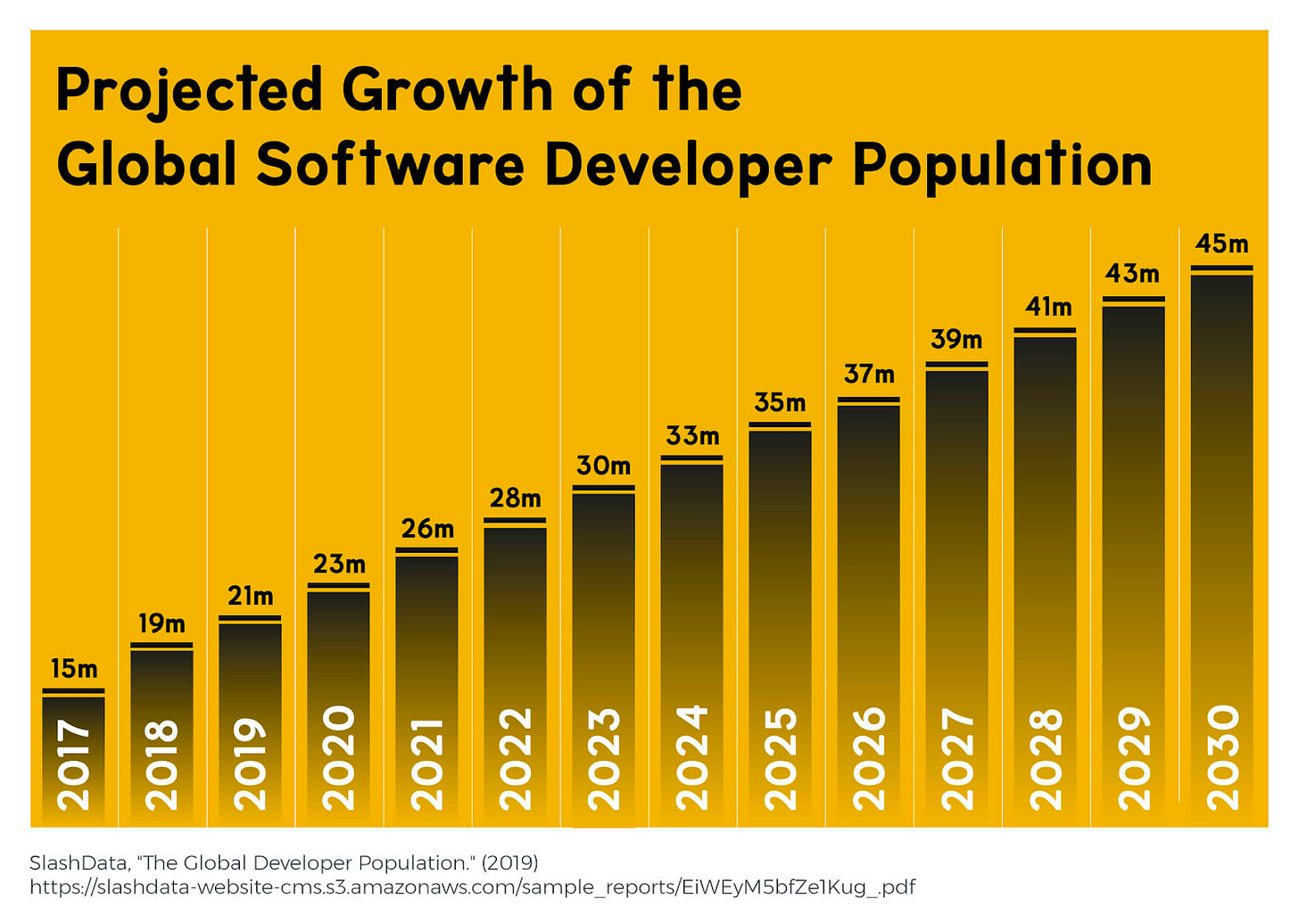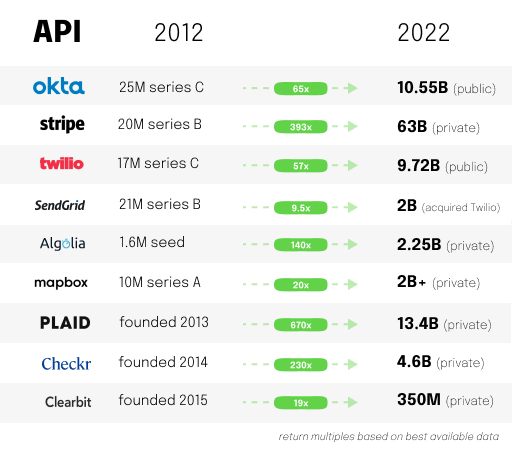If you are a technical founder, you should seriously consider building an API-first startup. They are recession resistant, serve rapidly growing markets without entrenched incumbents, and often require less capital to start than other software startups. We believe the next decade will see dozens of new API players grow to dominate new categories, much like Stripe and Twilio have done for payments and messaging.
The last 20 years were dominated and defined by SaaS companies. In 2004 Salesforce went public, proved the SaaS model, and opened the floodgates for SaaS startups. Today, there are more than 30,000 SaaS companies worldwide.
Software has successfully eaten half the world (64.4% to be exact), and is rapidly on the way to eating the rest. Every company in the world uses software, and universities continue to pump out as many software engineers as they possibly can to feed the unrelenting demand.
None of this is particularly groundbreaking. SaaS has emerged as an incredible new business model in the face of lower technical costs and barriers to entry. This has led to an explosion of SaaS startups. Naturally, this has also led to an insatiable demand for software developers to found companies & build apps. Again, nothing groundbreaking here.
What’s less obvious however, is the second order impact of the SaaS and software explosion: the creation of a massive new opportunity, the API layer.
The emergence of the API layer
SaaS was the predominant business model of the last 20 years, but over the last decade we’ve seen API businesses emerge and succeed with a new model. Stripe, Twilio, Mapbox, Plaid, Clearbit proved that a API-first product with consumption based monetization can win big.
These early winners solved common software problems shared by a large number of developers. Stripe solved payments, Twilio messaging, Algolia search, and so on. In each case, the company went to market with easy-to-use APIs that delivered best-in-class - and often complex - functionality behind the scenes - and won big as a result.
The modern software company is built on dozens of API building blocks, all providing essential functionality at a fraction of the cost of building it yourself.
Why you should start an API-first startup today
In 2023 we’re facing a recession - or at the least, a severe market correction. The investment fever of the last bull cycle is over, companies big and small are dramatically cutting costs, and high growth is no longer the only thing that matters. The “grow at all costs and raise more money” mantra has been replaced by “capital efficiency”, “positive unit economics”, “runway/burn rates”, and “gross/net retention”.
So while efficiency and discipline may be in vogue - growth still matters, especially if you want to raise capital (which is NOT the only path, FWIW).
Fair or not, investors and employees are now looking for companies that are capital efficient, growing fast, and have a high ceiling. Enter API-first companies - which we know can do this as well if not better than your standard SaaS company. At Clearbit, we launched our first product with less than $300K initial investment and scaled to $12M in ARR (spending less than $3M).
API-first companies can have efficient growth out of the gate for a few reasons:
Get to market faster: API products skip almost all of the front-end work of traditional SaaS and don’t typically have much in the way of a “user application”. As a result, they can often be built more quickly and cheaply, critical for iterating rapidly to product-market-fit. If you look at some of the bigger winners in the space you’ll see they raised a lot of capital over time. However, the capital needed to get to early PMF was tiny (Stripe: 2M, Twilio: 1M).
Serve a higher class customer: Technical users, while often opinionated, and *ahem* thrifty, are fantastic early adopters. As builders themselves, they often have excellent feedback, are quick to push the edges of the product, and can help inspire new features/ideas. At Clearbit, our top roadmap input was observing what crazy growth leaders at Slack, Figma, Notion, etc. were doing to sustain their growth & keep their GTM edge.
Compelling value even in a recession: API companies are a great value-add for companies looking to cut costs and/or move faster. Great APIs solve complex problems by abstracting a business function away behind an API and ultimately save developer, operations, and maintenance resources as a result. Usage of a best-in-class API costs less (and is faster) than hiring in-house developers to reinvent the wheel – the obvious choice for cash conscious companies facing a looming recession.
Identifying API opportunities
It may seem like there is already an API for everything, but there is room for hundreds more. Here are a few themes that can make for a great API-first business.
Replacing functionality (Stripe, Twilio, Algolia)
So the question is: what are critical functions for software projects that are time intensive, complicated or annoying to build from scratch?
That, even with a lot of time and effort, actually are better off if managed by a third party? Stripe, for example, built unique upstream relationships that gave its service a material advantage over what startups could hope to do in-house, even if they wanted to.
A few categories without a dominant winner and/or in need of reinvention:
Managing user login, authentication, identity, fraud, and privacy/preference management
Real-time uptime/performance monitoring
Dynamic compute optimization
Cross channel notifications and/or messaging
Automation of the painfully manual (NexHealth,Truework, Scale)
Particularly in B2B, there are still a litany of legacy systems and processes that are ripe for automation. These often sit within the less flashy areas of a business (IT, HR) or customer segments (Healthcare, Legal, Insurance). For example, TrueWork took a bite out of a legacy Equifax business unit by automating employee & income verification. NexHealth created an easy-to-integrate cloud “business in a box” for the long tail of doctor and dentist offices. Scale (pre LLM) made real & synthetic at-scale data processing a simple input/output.
So the question is: what are necessary evils (i.e. manual or expensive processes) that require human/systemic effort? And is there hard ROI in solving this beyond time-savings alone?
A few categories without a dominant winner and/or in need of reinvention:
Employee/user systems provisioning & onboarding/offboarding
Analysis of internal & external is communications channels (chat, support, email, conference calls, social) Data veracity at-scale (particularly with AI-produced data)
Reducing legal dependencies/costs
Domain & namespaces
Interoperability (Segment, Census, RapidAPI)
Individuals and companies have a lot of apps and will continue to have a lot of systems & apps. That much is obvious. With that, however, is the glaring need for better interoperability that give us our own network effects and/or making our management of apps easier. Segment and Census were masterful in making the previously nightmare-ish (app-by-app custom ETL/data modeling) into the trivially simple.
So the question is: what helps people or companies get more out of their systems or use their systems more effectively?
A few categories without a dominant winner and/or in need of reinvention:
Cross blockchain and web2<>web3 interoperability
Unstructured data transformation
API automation/interoperability
Procurement optimization
Text-to-SQL generation
Enabling new functionality (OpenAI, Plaid, Google Maps)
Without the Google Maps’ API, there would be no Uber or Lyft. Without Plaid, there would be no Robinhood. In both cases, the original creator built proprietary technology and then chose to give the functionality to the builders - not wall off the garden (ex. Linkedin, Twitter, Facebook) for their own apps/direct monetization. OpenAI could have built the greatest AI applications of all time - but will win much bigger for instead by powering the broader worlds’ own app development.
So the questions are: What can my proprietary technology do that developers can build on top of? What unique dynamic data does my app create that others can use or build on top of?
A few categories without a dominant winner and/or in need of reinvention:
Sky’s the limit on this one! You tell us :)
The year of the API
We believe that will be the year that dozens of multi billion dollar API companies are founded.
If you’re building an API first company or have an idea for one, we’d love to chat.
team@earlgrey.capital







The future is API-first.
Smashed the subscribe button